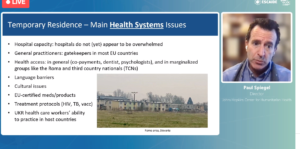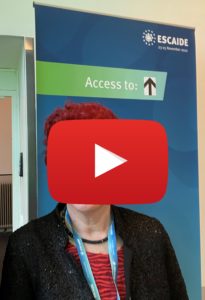
I attended during 24-26 November 2022 to the European Scientific Conference on Applied Infectious Disease Epidemiology (ESCAIDE), organized and hosted by the European Centre for Disease Prevention and Control (ECDC) in Stockholm during 24 – 26 November 2022. The conference was conducted in a hybrid mode, where a total of 500 and 2,400 persons attended in-person and online, respectively.
Here I share my impressions from the conference:
The first important topic was about Ethics: Alena Buyx, president of the German Ethics Council discussed about ethical boundaries and reminded us of the importance of keeping ethics in mind for future pandemics. She referenced the famous Ethicist Ross Upshur who said “The lesson we have learned is that we do not like to learn lessons” as he described we had learned a lot from the previous outbreaks and pandemics. Also, we need to focus more on vulnerability and resilience (for example to protect elderly people early on). We need to be more tolerant of uncertainties: for epidemiologists, we deal with risks in different specialties, but the public does not know it; therefore we need to keep a sense of togetherness. In the future, we need to include ethics in the process of policymaking, and we need to have ethically responsible tools of preparedness while keeping the option for civil society to be involved in the response to pandemics, which was already shown in a study by Driesen et al. in Germany.
The topic of the COVID-19 pandemic has complicated the responses to an already complex situation of the intersection between climate, conflicts and socioeconomic risks, in combination with rising food insecurity and displacement. Therefore the number of refugees is increasing and the funding to support them is decreasing. There is an emerging inequity in funding channeling to the global refugee situation. This will be a public health concern in the near future.

The topic of communication took a large part of the conference. The COVID19 pandemic moved very fast and therefore we need to invest more in communication with the public. The internet and social media made us realize that the so-called geographical borders are just political or “human-made” and the world has become as a single country. Also, we need to focus more on how we communicate scientific messages to the public. How do we make sure we are proactive in risk communication?, incidentally this topic was also reported by an international study by Cristea et al.
The topic of “One Health” was of importance as well, with emphasis on the power of working together as different disciplines. This will be a key element for the preparedness for the second pandemic and dealing with the consequences of climate change.
Finally, COVID19 has pushed different scientific methods to scale their work and to be innovative on how to work at a much faster pace. For example, the Polymerase Chain Reaction (PCR) testing and genome sequencing has increased by several folds post-COVID19.
Finally, I was lucky to interview Dr. Andrea Ammon, the director of ECDC who shared her take-home message from ESCAIDE to the world:

All presentations are available online for the public at https://www.escaide.eu/en/escaide-programme-2022
Comments